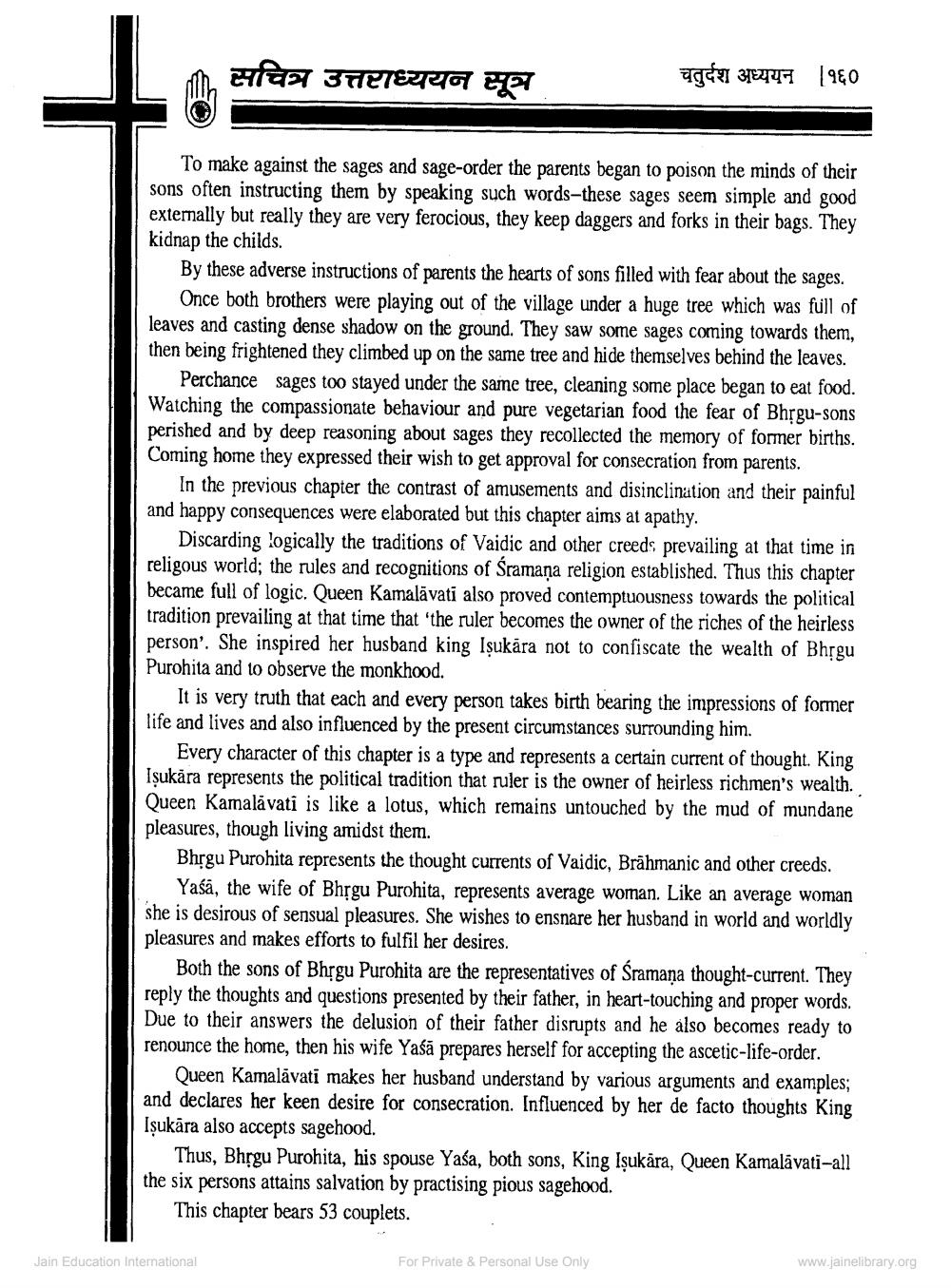________________
HIn सचित्र उत्तराध्ययन सूत्र
चतुर्दश अध्ययन [१६०
To make against the sages and sage-order the parents began to poison the minds of their sons often instructing them by speaking such words-these sages seem simple and good externally but really they are very ferocious, they keep daggers and forks in their bags. They kidnap the childs.
By these adverse instructions of parents the hearts of sons filled with fear about the sages.
Once both brothers were playing out of the village under a huge tree which was full of leaves and casting dense shadow on the ground. They saw some sages coming towards them, then being frightened they climbed up on the same tree and hide themselves behind the leaves.
Perchance sages too stayed under the same tree, cleaning some place began to eat food. Watching the compassionate behaviour and pure vegetarian food the fear of Bhrgu-sons perished and by deep reasoning about sages they recollected the memory of former births. Coming home they expressed their wish to get approval for consecration from parents.
In the previous chapter the contrast of amusements and disinclination and their painful and happy consequences were elaborated but this chapter aims at apathy.
Discarding logically the traditions of Vaidic and other creeds prevailing at that time in religous world; the rules and recognitions of Sramaņa religion established. Thus this chapter became full of logic. Queen Kamalāvati also proved contemptuousness towards the political tradition prevailing at that time that 'the ruler becomes the owner of the riches of the heirless person'. She inspired her husband king Isukāra not to confiscate the wealth of Bhrgu Purohita and to observe the monkhood.
It is very truth that each and every person takes birth bearing the impressions of former life and lives and also influenced by the present circumstances surrounding him.
Every character of this chapter is a type and represents a certain current of thought. King İşukára represents the political tradition that ruler is the owner of heirless richmen's wealth. Queen Kamalăvati is like a lotus, which remains untouched by the mud of mundane pleasures, though living amidst them.
Bhrgu Purohita represents the thought currents of Vaidic, Brāhmanic and other creeds.
Yaśā, the wife of Bhrgu Purohita, represents average woman. Like an average woman she is desirous of sensual pleasures. She wishes to ensnare her husband in world and worldly pleasures and makes efforts to fulfil her desires.
Both the sons of Bhrgu Purohita are the representatives of Sramana thought-current. They reply the thoughts and questions presented by their father, in heart-touching and proper words, Due to their answers the delusion of their father disrupts and he also becomes ready to renounce the home, then his wife Yaśã prepares herself for accepting the ascetic-life-order.
Queen Kamalavati makes her husband understand by various arguments and examples; and declares her keen desire for consecration. Influenced by her de facto thoughts King Işukāra also accepts sagehood.
Thus, Bhrgu Purohita, his spouse Yaśa, both sons, King Işukāra, Queen Kamalāvati-all the six persons attains salvation by practising pious sagehood.
This chapter bears 53 couplets.
Jain Education International
For Private & Personal Use Only
www.jainelibrary.org




